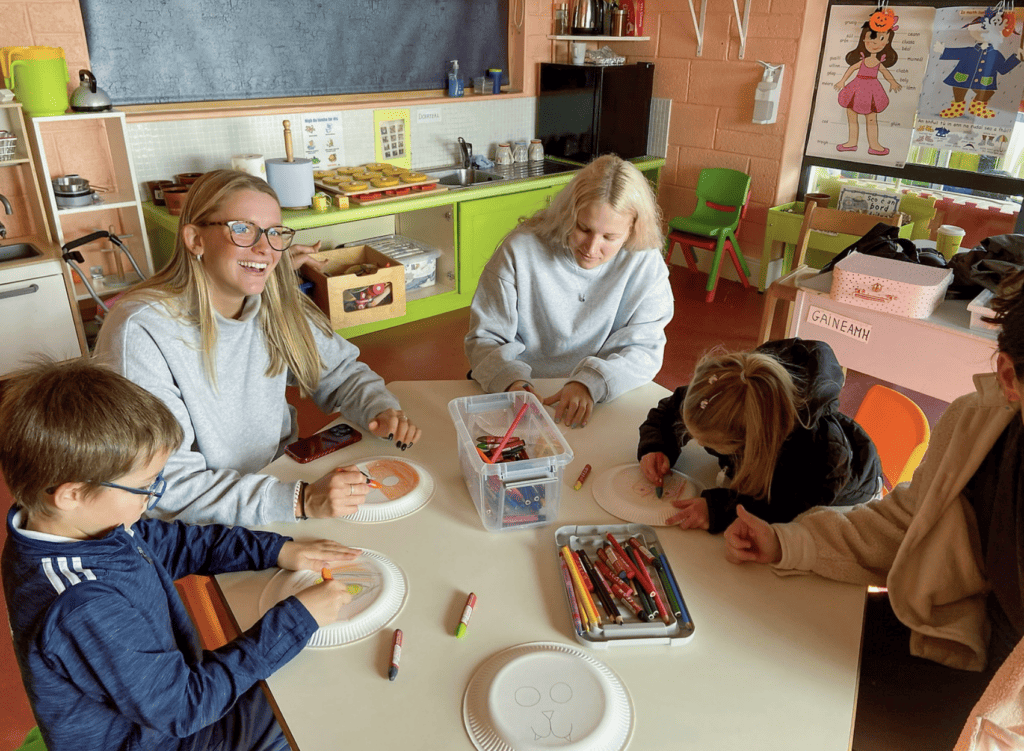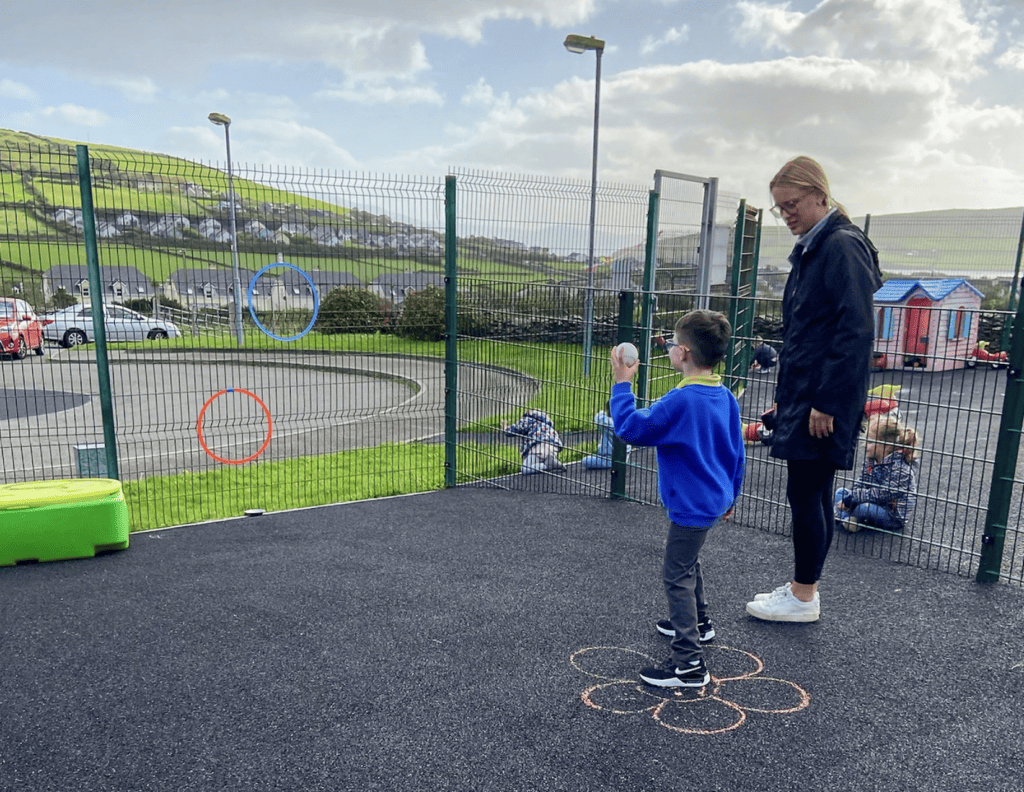Dingle children benefit from occupational therapy camp; teachers and parents attend workshops

Sacred Heart University’s occupational therapy (OT) program sent a team of faculty members and graduate students to Dingle, Ireland, in the fall to bring needed OT services to schools and families.
The team included OT faculty members Sharon McCloskey and Ellen Martino, and Donna Bowers, a SHU physical therapy professor. The participating OT graduate students, who are all in their final year, were Lydia Reppucci, Fiona Buckley, Caitlin Pursell, Sofia Bramante, Cassandra Dwight, Nicole Koshes, Emily Comer and Catherine Graviano.
“While special education laws in Ireland create inclusive learning environments, the law does not include mandatory access to occupational therapy in elementary school settings,” said McCloskey, a Dublin native who has more than 35 years of experience in pediatric OT and school-based OT practice. She said families face a two- to four-year waiting list for an assessment of need before receiving special education in the mainstream setting, and related services do not include OT to support children’s school participation.
McCloskey contacted the principals of the two national schools in Dingle and offered to visit and discuss strategies to help students with attention disorders, autism and other concerns. “There is an inclusive environment in the national schools,” McCloskey said. She acknowledged that the teachers are excellent and believed bringing an “OT lens” into the classroom could be an enriching experience.
“I suggested a pilot project that could benefit both teachers and students,” she said.
McCloskey identified a need to support teachers in “the delivery of strategies for differentiated instruction, to help children in their learning, incorporating classroom interventions to address the physical, cognitive, psychosocial and sensory components of school performance.”
As a pilot project, McCloskey and Martino designed a service-learning capstone for the OT students to work with teachers and families in Dingle, to develop and strengthen OT students skills of observation, intervention and processes. The group went to Bunscoil an Chlochair girls’ school and Scoil Iognáid Rís boys’ school in the mornings and also offered an OT camp at the Áiseanna na hOige after-school program.
“Since this was the first time our program has done a capstone in Ireland, we tried to get a feel for the children’s needs in this community and pass on as much knowledge and as many strategies as we could,” said Dwight.
The OT camp was designed as a play-based experience for the children. The OT students worked together to create a “daily activities” plan, some of which changed once they arrived on site. In the elementary schools, they observed children in the classrooms, paying close attention to those the teachers identified as needing support services. They collaborated with teachers on creative strategies for the classroom.
In collaboration with Martino, McCloskey and Bowers, the students ran some sensory motor groups for children outside of the classroom. “This was mostly student-run, and I think we’re all proud of that,” said Buckley.
While the SHU students worked with the children, faculty members held a professional development presentation for the teachers of both schools. At the end of the week, the OT students and faculty invited all parents and caregivers in the community to a Saturday workshop on play and child development. Thanks to the enormous support of the staff at SHU in Dingle, the community event was very successful and well received by everyone in attendance.
A great experience for all involved
Martino said the service-learning trip provided graduate OT students an opportunity to observe and interact with elementary school children, teachers, administrators and parents in a small, rural community. “The SHU students gained understanding and experience in providing play-based activities to promote learning,” she said. “They practiced planning and implementing activities to address sensory, motor and social development and adapted activities to meet the needs of children with varying skill levels. They also provided education to parents so they could incorporate playful learning at home.”
Grace Flannery, who co-directs Sacred Heart’s Dingle program, said time and resource limitations in Dingle result in many children missing out on the chance to engage with occupational therapists. “The OT workshops the SHU students organized significantly empowered both parents and teachers to better assist children in the community dealing with developmental hurdles,” she said.
“These workshops provided an invaluable opportunity for participants to learn effective ways to support children facing various challenges,” Flannery continued. “They proved to be beneficial for many, and all the attendees are enthusiastic to welcome the OT students for a follow-up session in 2024.”
SHU students find experience fulfilling
Participating students said they feel they made a difference during their stay. Comer noted that waiting lists for OT services can be long in the Dingle area, providing an opportunity to step in to support access, and “to make sure children get the services they need in school,” she said.
Koshes felt a similar drive to help. She said as the SHU group was preparing for the trip and learning what was and wasn’t available in Dingle, she became more excited to go there and suggest strategies. She was determined to help parents and teachers learn more about OT and how it can support their children.
Buckley and Dwight identified challenges facing OT services on the ground in Dingle before embarking on the trip because they had studied Ireland previously in their needs assessment class at SHU and collected research and data about services there.
All the students found the work fulfilling. Repucci said the parents and teachers were grateful for the strategies to use at home or in the classroom to support attention, behavior and handwriting. The SHU group has discussed creating faculty- or student-run webinars to stay in touch with and continue providing support for the schools and families, Repucci added.
The stay in Dingle was relatively short but very productive, according to Pursell. “We were only working there for a week, but in that time, we made strong connections with some of the kids,” she said.
The hands-on experience reinforced the knowledge Bramante said she and the other students have been acquiring in their program. “We discovered that we all know more than we think we do,” Bramante said. “It was validating to put what we’ve been learning into practice.”

